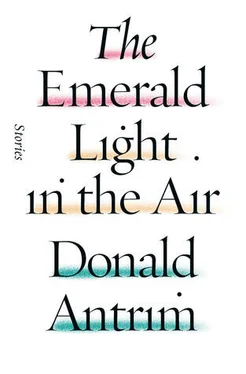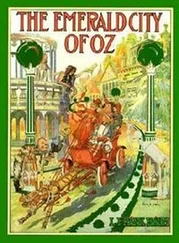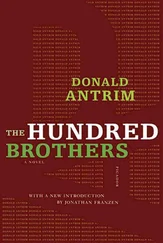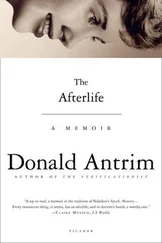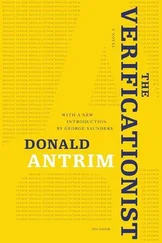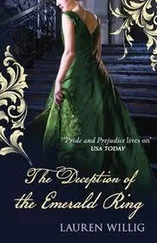He swatted a mosquito and got the branch in both hands. The wood was damp, and the end of the bough flexed and bent when he pulled. He moved down to a thicker part, planted his feet, and leaned back. After four or five difficult heave-hos, he’d opened enough clearance, he thought, to steer the car through. He was out of breath and his shirt was wet and sticky. He got in the driver’s seat and eased the Mercedes onto the oncoming side of the road. The ground sloped down from the road’s edge and the soil had taken on rain. As he was working his way around the branch, wheels partly on the shoulder, the car tipped to the left and then shifted further, and a piece of ground seemed to fall away underneath. It was startling: a little slide and the Mercedes plunged. Then the tires dug in, and, abruptly, a distance off the road and at a steep angle, the car settled and stopped. Billy pushed his foot against the brake. He gripped the steering wheel. When he took his hands off, he saw that he’d scraped his palms on the locust. He was bleeding.
“Shit, fuck. Shit,” he said aloud.
He turned off the engine. He hadn’t slept the night before. It wasn’t the thunder and lightning that had kept him up — he’d been going through the artworks that Julia had left rolled in tubes or stacked against the wall in the upstairs bedroom that had been her studio. They were piled in the backseat now. The paintings, he thought, while sitting in the car perched on the berm, were not as strong as the drawings, which, though more or less precise studies for their oil counterparts, all rural Virginia scenes — trees in a field, a dying pond, a rotting house in a mountain hollow — nonetheless had about them, with their bold erasures and smudges and retraced pencil lines, the feeling of something abstract and, in comparison with the worked and reworked paintings, complexly three-dimensional. The paintings seemed to exist as strangely flat fields — they put Billy in mind of Early American naïve art — and, in looking at them and, back in the day, talking to Julia about them, he’d come to see how purposefully she distorted light and shadow. “I’m searching for something that isn’t quite there,” she’d once said.
He was afraid of shifting his weight and starting another slide — the car had gone four or five feet already, and the embankment fell maybe ten more. He could hear running water. Was there a creek off in the woods? He knew this country, or thought he did, but it was always surprising him, just the same.
He wiped his hands on his pants. Gently now, he ratcheted down the brake. He eased open the driver’s-side door.
Anyway, her drawings and paintings — he knew better than to throw them out, but the fact of them in his house was terrible. He’d meant for some time to do something about them. At first, of course, he’d tried to get them back to her, but she’d told him — this was during one of their five or six phone conversations since her departure, two years earlier — that her old work was no longer meaningful or important to her. “I’m not doing that kind of painting anymore,” she’d said. “I’m engaged with a more total realism.”
“Photo-realism?” he’d asked.
“No, nothing like that.”
He was standing in the kitchen in his socks and underwear, drinking bourbon and Coke — his mother’s drink. Ice rattled in the glass. The floor was brown and dirty, in need of mopping.
Julia said, “Billy, you’re drinking.”
Oh, God, how to get out of the Mercedes safely? The hillside was steep and the grass was wet. And what if he made it, with both feet firmly on the ground, and the car slid down on top of him?
He pushed the car door open all the way and, clutching the doorframe for balance, tumbled out onto the incline. Fuck Julia. He could take her pictures and toss them into the woods right now.
He had weed in the glove compartment. Might there be a stray Ativan or two in there as well? The thing to do was slog around to the uphill side, the passenger side, reach through the window, and feel around in the glove compartment for whatever he could find. But wouldn’t you know it? He got partway around the Mercedes, and the whole car seemed to shudder and tremble. Billy watched it start into another drop — it was as if the car were shaking its wheels free of the mire — and then down the grade it rumbled, through the mud and across the grass, sliding to a rest at last in a patch of milkweed at the foot of the hill.
He felt a raindrop, and another. The clouds were not in sight yet, but Billy could sense the weight of low pressure bearing down. An emerald light was in the air. The birds and other animals had gone quiet; the world was still, as it can be when bad weather is coming. He was thinking of Mary. By the time he’d managed to have sex with Mary, back in high school — she was a senior and he was a junior, and that fact alone was thrilling — she’d already had one abortion and one marriage proposal.
He half walked, half slid down the hill. The Mercedes was sitting in a gulch between the woods and the embankment. He heard running water again — the creek had to be close. He reached gently into his pocket and took out his phone. His hands were a cut-up mess. The garage he used for the Mercedes was on the other side of Charlottesville, close to Julia and Mark’s farm, and, anyway, too far for a tow truck to come. Could he drive back up to the road? It didn’t look to Billy as if there’d be much room to maneuver.
Daily life’s frustrations, even the big ones, no longer ruled him, not the way they had for a long time in his life. He’d been psychotic with agitation that had grown from his grief, and it was hard for him to remember what that had been like, exactly: not the grief — he had plenty of that still — but the urge to die. He’d got all but there. He’d had the Browning loaded. He’d had it ready and at hand, a few times.
He smelled storm. He might be able to drive for a while beside the road. The sun was high. Billy put his phone in his pocket and got back in the Mercedes. The car seemed all right. He drove slowly. He was in a wide but navigable trench. It wasn’t bad driving. The trench curved slowly around to the right, and then came to a straight section that reminded Billy of the Roman road that he and Julia had walked a length of during that difficult vacation in Italy, the winter before she left.
They’d gone to see the paintings and frescoes of Tiepolo. Billy had become vocal about Tiepolo after seeing Bacchus and Ariadne in Washington, and Julia had got into him, too. After Christmas in Rome, they had taken the train north to Venice, and had spent a week walking around in the cold, searching out churches and palazzos and wandering the Gallerie dell’Accademia, where they had both become enchanted, though for different reasons, with The Rape of Europa . Julia got excited over the distant meeting of clouds and sea in the picture’s right-hand corner, while Billy fixated on the encroaching cloud plume to the left, the spire of pink and gray — it looked to him like a mushroom cloud — exploding upward from behind the rocky outcropping on which Zeus, transformed into a bull, seduces the Phoenician princess Europa, dressed in white and attended by ladies-in-waiting. The cloud threatens to wipe them all out, but Europa and her entourage seem either unconcerned or unaware. She sits enthroned on the back of Zeus. Two other bulls wait nearby. A maid tends to Europa’s hair and another bathes her feet; shepherds and an African are on hand, and putti fly about and urinate from on high, and a black bird perches on a strange little cumulus cloud that has floated in over the princess’s head.
There was the creek. It came out of the woods and flowed into a concrete drainpipe that tunneled under the road. A stretch near the trees looked fordable. He could angle the car just so, over and between the rocks. Once he got to the other side, though, where was he going to go? Trees pushed against the embankment, and the way was overgrown. Billy nosed the car forward anyway. He felt a curiosity. The undercarriage of the Mercedes was not high, and when the wheels dropped into the water Billy heard and felt the bumper scrape the rocks. He jerked the car, not across but up the creek — maybe he could follow it out into a field or a yard somewhere upstream. The retirement home where his parents had ended their lives was up the way he’d come that morning, not on the little lane but on the bigger road at the end of it, heading down from the hills toward town. He saw lightning in the distance, and peered through the windshield at the dark clouds now crossing the sky over Afton Mountain.
Читать дальше
